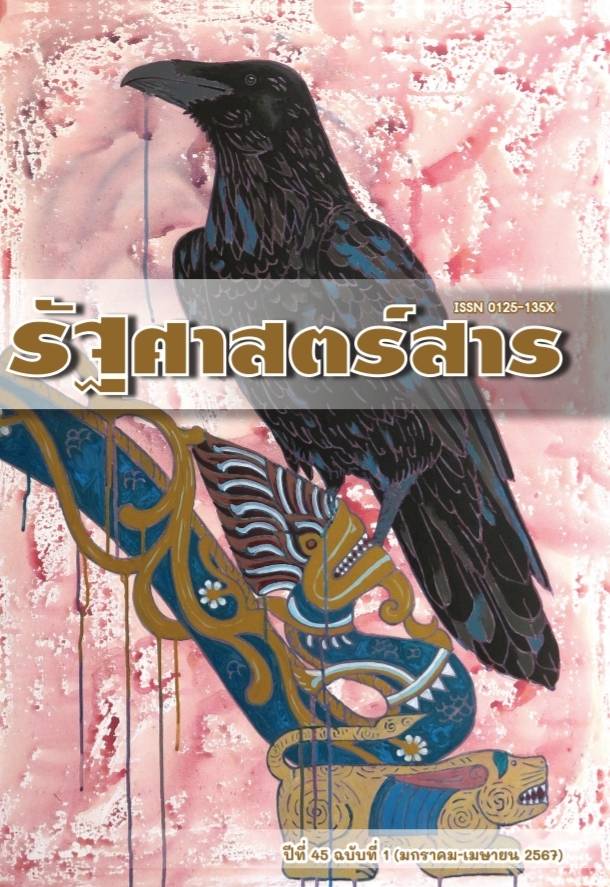แนวคิดและวิธีการทางประวัติศาสตร์ของ อี.พี. ธอมป์สัน (E.P.Thompson) ใน The Making of the English Working Class
Main Article Content
บทคัดย่อ
อี.พี. ธอมป์สัน (E.P.Thompson) เป็นที่รู้จักอย่างกว้างขวางทั้งในฐานะนักประวัติศาสตร์, นักเขียนบทความ และนักกิจกรรมการเมือง และเป็นผู้ที่ก่อให้เกิดการถกเถียงมากที่สุดในหมู่นักประวัติศาสตร์มาร์กซิสต์อังกฤษทั้งหมด The Making of the English Working Class (1963) ทำให้ธอมป์สันกลายเป็น "นักประวัติศาสตร์ที่ถูกอ้างถึงอย่างกว้างขวางที่สุดในโลกของศตวรรษที่ 20" ใน The Making of the English Working Class ธอมป์สันเล่าถึงวิธีการที่ประชาชนผู้ใช้แรงงานอังกฤษเกิดความรู้สึกเป็นหนึ่งเดียวกันขึ้นในหมู่พวกเขา และต่อต้านนายจ้างของพวกเขาในช่วงระหว่างปี 1790 และ 1830 ข้อเสนอที่สำคัญของ The Making of the English Working Class ก็คือ "ชนชั้น" (class) ไม่ใช่ "สิ่งๆ หนึ่ง" (a thing), ไม่ใช่การตีความทางทฤษฎี (theoretical construct), ไม่ใช่โครงสร้าง (structure) หรือ หมวดหมู่ (category) หากแต่เป็น "ปรากฏการณ์ทางประวัติศาสตร์" (a historical phenomenon) ที่เกิดขึ้นจากความสัมพันธ์ของมนุษย์ ดังที่ธอมป์สันกล่าวว่า "ชนชั้นเกิดขึ้นเมื่อมนุษย์บางพวก, ในฐานะผู้ที่มีประสบการณ์ร่วม (ทั้งที่สืบทอดมาจากอดีต และแบ่งปันร่วมกันในปัจจุบัน), รู้สึกถึงและแสดงอัตลักษณ์เกี่ยวกับผลประโยชน์ของพวกเขาออกมาอย่างชัดแจ้ง ทั้งในหมู่พวกเขาเอง และที่ต่อต้านขัดแย้งกับมนุษย์คนอื่นๆ ผู้ซึ่งมีอัตลักษณ์ทางผลประโยชน์แตกต่างออกไป (และมักจะอยู่ตรงกันข้ามเสมอ) จากผลประโยชน์ของพวกเขา" ดังนั้น "ชนชั้น" จึงเป็นหนี้บุญคุณต่อ "ตัวกระทำการ" (agency) มากพอๆ กับ "สภาพเงื่อนไขภายนอกที่กำลังเปลี่ยนแปลง" (conditioning) และประชาชนผู้ใช้แรงงานก็ต่อสู้ด้วยการดึงเอาขนบประเพณีแบบอังกฤษออกมา "สร้าง" ให้ตัวของพวกเขาเองกลายเป็นชนชั้นหนึ่ง
Article Details
เอกสารอ้างอิง
หนังสือ
Abelove, Henry, et al., Visions of History, (New York: Pantheon, 1983).
Anderson, Perry, Arguments Within English Marxism, (London: Verso, 1980).
Dworkin, Dennis, Cultural Maxist in Postwar Britain: History, the New Left and the Origins of Cultural Studies, (Durham and London: Duke University Press, 1997).
Eley, Geoff, A Crooked Line: From Cultural History to the History of Society, (the United State of America: The University of Michigan Press, 2005).
Fieldhouse, Roger and Taylor, Richard (ed.), E.P.Thompson and English Radicalism, (Manchester and New York: Manchester University Press, 2013).
Hill, Christopher., "Men as They Live Their Own History," in Christopher Hill. Change and Continuty in Seventeenth-Century England. ambridge, (Mass: Harvard University Press, 1975), 241-242.
Hilton, Rodney, Bond Men and Made Free: Medival Peasant Movements and the English Rising 0f 1381. (London: Methuen, 1977).
Hobsbawm, Eric., "The Making of the Working Class, 1870-1914," in Eric Hobsbawm, Workers: World of Labor, (New York: Pantheon Books, 1984(.
Hughes-Warrington, Marnie, Fifty key thinkers on history, (New York: Routledge, 2015).
Iggers, Georg G., Historiography in the Twentieth Century, (Wesleyan University Press, 2005).
Jones, Gareth Stedman, Languagees of Class: Studies in English Working Class History 1832-1982, (Cambridge: Cambridge University Press, 1983).
Kaye, Harvey J., "E.P.Thompson, The British Marxist Historical Tradition and the Contemporary Crisis.," in Harvey J. Kaye and Keith McClelland. (eds). E. P. Thompson: Critical Perspectives, Philadelphia, (PA: Temple University Press, 1990, 252-275.
Kaye, Harvey J., The British Marxist Historians: an introductory analysis, (Cambridge: Polity Press, 1984).
Maza, Sarah, Thinking About History, (Chicago: University of Chicago Press, 2017).
Rogan, Tim., The Moral Economists: R. H. Tawney, Karl Polanyi, E. P. Thompson, and the Critique of Capitalism, (Princeton University Press, 2017).
Sarkar, Sumit., "The Relevance of E.P.Thompson," in Sumit Sarkar, Writing Social History, (Delhi: Oxford University Press, 1997, 50-81).
Scott, Joan Wallach, Gender and the Politics of History, (New York: Columbia University Press, 1999).
Sewell, William, "How Classes are Made: Critical Reflections on E.P.Thompson's Theory of Working- class Fromation," in Harvey J. Kaye and Keith McClelland (ed.), E.P.Thompson: Critical Perspectives, (Philadelphia: Temple University Press, 1990, 50-77).
Thompson, E.P., "Moral Economy of the English Crowd in the Eigteenth Century," in E.P.Thompson. Customs in Common, (New York: The New Press, 1991, 185-258).
Thompson, E.P., "Time, Work-Discipline, and Industrial Capitalism,” Past & Present, 38 (February 1967), 56-97.
Thompson, E.P., Beyond the Frontier: The Politic of a Failed Mission, (London and Stanford, CA: Merlin Press and Stanford University Press, 1997).
Thompson, E.P., Customs in Common, (New York: The New Press, 1991).
Thompson, E.P., Protest and Survive, (Harmondsworth: Penguin, 1980).
Thompson, E.P., The Making of the English Working Class, (Harmondsworth: Penguin, 1963).
Thompson, E.P., The Poverty of Theory, (London: Merlin Press, 1978).
Thompson, E.P., Whigs and hunters: The origins of the Black Act, (Harmondsworth: Pantheon, 1975).
Thompson, E.P., William Morris: Romantic to Revolutionary, (Newyork: Phantheon Book, 1977).
Thompson, E.P., Zero Option, (London: Merlin Press, 1982).
Winslow, Cal (ed.), E.P.Thompson and the Making of the New Left: Essays and Polemics, (Newyork: Monthly Review Press, 2014).
บทความ
Abelove, Henry. "Review Essay of The Poverty of Theory," in American Historical Review, 84 (December 1979), 142.
Dawley, Alan, "E.P.Thompson and the Pecularities of the American," Radical History Review, No.19 (Winner 1978-1979), 39.
Hobsbawm, Eric, "Methodism and the Threat of Revolution," History Today, 1957, VII, p.xiv.
Johnson, Rechard, "Thompson, Genovese and Socialist-Humanist History," History Workshop, Vol. 6 (Autumn 1978), 79-100.
Thompson, E.P., "Eighteenth-century English Society: class struggle without class?", Social History, Vol. 3 (May 1978), 133-165.
Thompson, E.P., "Patrician Society, Plebeian Culture" Journal of Social History, Vol. 7, No. 4 (Summer, 1974), 382-405.
Wood, Ellen Meiksins, "The Politics of Theory and the Concept of Class: E.P. Thompson and His Critics," A Socialist Review, Vol. 9 (1982), 45-75.


